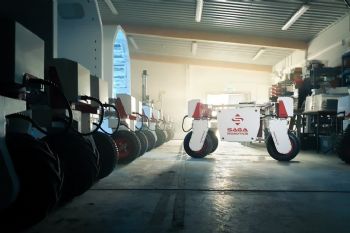
The future of UK and international farming and food production has been boosted after Innovate UK announced last week that it is providing funding of £2.5 million for what is widely considered to be the world’s first robotic farm.
‘Robot Highways’ is a project which aims to ensure industry sustainability by addressing labour shortages, the need for global food production and reduce the environmental impact of the farming sector.
The successful consortium responsible for delivering ‘Robot Highways’ consists of Saga Robotics, global leaders in robotics and autonomous systems (RAS) technology for the soft fruit sector, the University of Lincoln (Europe’s largest academic research centre on agri-robotics), University of Reading (knowledge exchange and economic evaluation specialists), Manufacturing Technology Centre Ltd, Berry Gardens Growers, BT, and Clock House Farm Ltd (leader in the soft and stone fruit growing sector).
The consortium has delivered a vision for the future of soft fruit farming, and will create the largest known global demonstration of RAS technologies that fuse multiple application technologies across a single farming system.
With an aim to be delivered by 2025 across the UK, a fleet of robots will perform a multitude of on-farm functions as one operation, powered by renewable energy.
The project is key to industry sustainability by reducing sector reliance on seasonal labour, estimating a 40% reduction in the labour required.
‘Robot Highways’ will also provide solutions for moving the sector towards a carbon zero future. With an estimated 20% reduction fruit waste, 90% reduction in fungicide use, huge reduction in use of fossil fuel across all farm logistic operations and a 15% increase in farm productivity.
Artificial intelligence and machine learning technologies will be harnessed, and crucial improvements will be made to telecommunications infrastructure in rural settings.
The University of Lincoln – through its Lincoln Institute for Agri-food Technology - will be leading the academic contribution to robotic development and coordinating the fleet control system.
Professor Andrew Hunter, the University of Lincoln's Deputy Vice Chancellor for Research and Innovation, said: "We are delighted that the University as part of the consortium has been awarded funding by Innovate UK deliver this innovative and essential work.
“It is widely agreed that robotics will transform the food and farming industries in the coming years, as producers adapt to meet significantly increased global demand, but there is still so much research and development to be done.
“Robot Highways is extremely timely as it will service a pressing national and international need and positions Lincolnshire, and the UK, at the leading edge of research innovations in this truly global industry.
“Agri-food is the largest manufacturing sector in the UK – twice the scale of automotive and aerospace combined – supporting a food chain which generates a Gross Value Added (GVA) of £113bn, with 3.9 million employees in a truly international industry.”
Professor Simon Pearson, director of the Lincoln Institute for Agri-Food Technology, said: “This is a significant step forward in taking robotics onwards towards the market. I am delighted that opportunities are being realised for the sector and agri-food robotics specifically.”
University of Reading’s School of Agriculture, Policy and Development will be evaluating the economic benefits of the new robotic agricultural technologies, and bringing growers, policy-makers and developers together to create suitable robotic technology for agricultural use.
Dr David Rose, Associate Professor of Agricultural Innovation and Extension at the University of Reading, said: "Autonomous robotic technologies could play a key role in the future of agricultural production, but only if they are trusted, reliable, and provide a tangible benefit for farmers.
“We will be analysing the economic impact of robotic farming technology to assess what benefits are possible. We will also be engaging with grower communities, policy-makers and tech developers to ensure that any solutions that are developed are co-designed and will be suitable for use out in the field.”